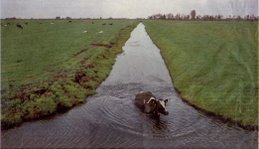In October and November, I visited Istanbul and the Balkans by car; went to the opposite side of the European area to the Canary Islands and Morocco by plane. It has been some weeks without direct reporting or commenting in English on European affairs.
But in December, we'll see some fruits of those explorations.
Istanbul was the location of a conference on city regeneration in Europe, organised jointly by the world architects and urbanists organisation INTA, a transborder, Italian-led, cities network, and the Anadolu High School, who was host. Multimillion Istanbul agglomeration played no real role in this event. I tried to discover it on my own. My hopes for Turkish integration into the EU were not disappointed. Istanbul is a modern, western city with all the problems and opportunities that go with such a status.
I stopped by in central Bulgaria, where I discovered the ancient city of Plovdiv (Philippople - Philippopolis, ancient Macedonian capital). Presence of an EU agency, charged with seeking solutions for discrepancies with the EU acquis. Problems with Turkish and islamo-slavic minorities as well as with gypsies. And a rich series of unused opportunities: economic, social and cultural.
Driving back home, I revisited the Serbian countryside, where, as long ago as 1962, we helped to build a motorway ("autoput") between Belgrade and Nish. The Velika Plana people occupy still a warm spot in my memory. However, their actions in Bosnian Srebrenica, just over the Drina border, in 1995, when they started to kill over 8.000 Muslim inhabitants under the eyes of a Dutch UN force, were still visible on the Potocari location. Most shocking were the graffitti the Dutch soldiers left behind after their shameful retreat.
Croatia and Slovenia showed much progress in Europeanisation. Slovenia is already a member of the EU and it is using the Euro as currency. A small, industrious and Austria-dominated region, good at delivering services and receiving tourists. Croatia could become a second, and smaller Poland, in the EU. Very catholic, very pro-US, and, if I may believe Ulfkotte on that point , completely subdued by western secret services and their hired companies. Infrastructure very modern and very privatised.
The Canaries are a subtropical outpost of Spain. No effort has been neglected, to make this African archipelago look like a normal Spanish province. Some 100 KMs from the Moroccan Saharian coast, Europe's Florida is thriving. Two million inhabitants. Equipped with everything you would expect in an 21st century western country.
100 KMs away, lies Morocco, or, to be exact, the former Spanish Sahara, that has been claimed and occupied by Morocco. I was there in 1979. A guerilla was then, and still now, being fought by the saharian nomadic people, bleeding the Moroccan army and resources as well as theirs. No solution on the horizon.
In Morocco itself (Casablanca, Meknès, Rabat, Tangier, Marrakesh), I studied the work of urban regeneration colleagues, working in deprived bidonvilles, where islamist groupings steal the show by providing material and medical help. Conditions for a more secularist and emancipation-oriented policy are weak. No money, no urgency on government level. What could the EU do? Most investments under association contracts go to big infrastructural undertakings. My contribution to another policy could be a research into the conditions under which, some decades ago, the European middle classes decided to forge the welfare state. Such conditions, evidently do not exist in 2007 Morocco. Modernisation, as applied by the new king, in matters like more freedom for women, mostly help middle class and upper class people, who have no interest in sharing their wealth with the poor masses.
Moroccan civilization, its rich cultural and intellectual heritage, preserved by the French during their rule from the twenties to the fifties, offer many opportunities for an independent take-off. But it is not happening. It was sad to see, how a potentially rich and thriving society is condemned to serve, again and again as an economic backyard to the North.
Thursday, December 06, 2007
Subscribe to:
Post Comments (Atom)




No comments:
Post a Comment